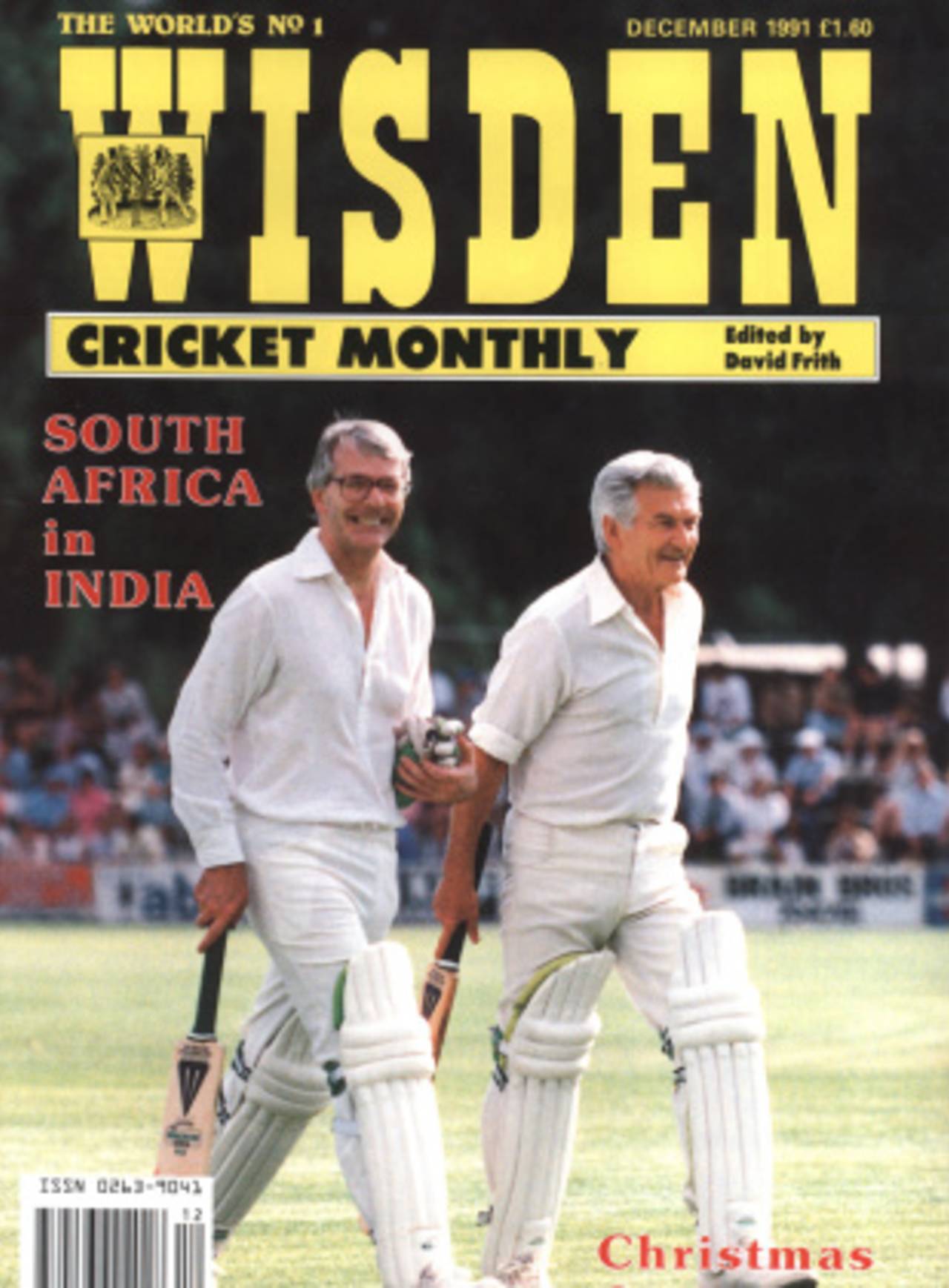Vote for me and I'll bat for you
With Pakistan's new prime minister Nawaz Sharif being a former first-class cricketer and Imran Khan in the opposition, it's time for another look at cricketers with a passing interest in politics and politicians who were fans of the game

John Major and Bob Hawke on the cover of Wisden Cricket Monthly's December 1991 issue • Wisden Cricket Monthly
The only British prime minister to have played first-class cricket, Lord Dunglass (as he then was) took part in ten matches in the 1920s, including two for Middlesex and some on an MCC tour of South America. Gubby Allen, the England captain who was a schoolmate at Eton, thought him a useful swing bowler. In 1966, not long after his year as prime minister, Sir Alec Douglas-Home was president of MCC.
The long-serving Sri Lankan captain Ranatunga was a great talker out on the pitch, and it was no great surprise when on retirement he followed his father Reggie - a government minister - into politics. Ranatunga, who led his country to World Cup success in 1996, recently had a spell as Sri Lanka's Deputy Minister for Tourism.
One of Ranatunga's team-mates in that World Cup-winning side, Jayasuriya later joined his captain in parliament too: he became an MP for his native Matara in 2010. There was much muttering - not least from the other players - when ministerial pressure brought about Jayasuriya's return to the national team for the one-day section of the 2011 tour of England: Jayasuriya nearly demonstrated the diplomatic skills he would need in his new career by announcing he would retire for good after the first one-dayer at Lord's.
Probably the scariest sight for a Test batsman in the 1960s was Hall tearing in, gold crucifix glinting, ready to unleash another bouncer. He took 192 Test wickets, and has kept himself occupied since he retired: he served in both the Barbados Senate and its House of Assembly, and became the island's minister for tourism in 1987. Later he became the Reverend Wes when he was ordained as a church minister, and Sir Wes when he was knighted in 2012.
The multi-talented Charles Burgess Fry played cricket and football for England, good-class rugby, once equalled the world long-jump record, and was also reputedly offered the throne of Albania. In between this, running a naval academy and publishing a sporting magazine, Fry somehow found time for three attempts to enter parliament. All were unsuccessful, but only narrowly.
Currently the Shadow Chancellor, and a Cabinet minister in the previous Labour administration, the well-padded Balls stood behind the stumps for the Lords and Commons (the British parliamentary team) in a match at Lord's in 2011. He didn't have much time to strut his stuff, though, as rain soon ended play - but the watching Alec Stewart had seen enough: "More shopkeeper than wicketkeeper," he grunted.
The Australian prime minister from 1983 to 1991, Hawke was a Rhodes Scholar at Oxford in the 1950s, and was reputedly 12th man for the university side, although he never played a first-class match. During a break in talks at a Commonwealth summit meeting in Zimbabwe in 1991 he opened the batting (and got onto the cover of Wisden Cricket Monthly) with...
Britain's prime minister from 1990 to 1997, Major was a promising player in his youth, but dreams of top-class cricket faded when he injured his knee badly in a plane crash. When the Conservatives' defeat at the 2001 general election was confirmed, Major was watching cricket at The Oval; he later became their president, and served on MCC's committee as well. He has also written a book on the early history of cricket.

The stylish Dexter led England in the 1964 Ashes series - but gave up the captaincy to contest a seat in the general election. He lost the vote to Jim Callaghan, who later became prime minister. Dexter joined the winter tour of South Africa late, and never did captain England again.
The legendary broadcaster and commentator Arlott was twice the Liberal candidate for the seat of Epping, in Essex, during general elections in the 1950s. He came in third both times, and presumably decided to stick to cricket. His defeat wasn't entirely surprising, as on the first occasion he could only bring himself to knock on two doors - the first occupant said he was a staunch Labour voter, and the second said, "What election?"
Quite apart from Bob Hawke (see above), several other occupants of Australia's hottest political seat have been what one of them, John Howard, called "cricket tragics". Howard himself flirted with the idea of becoming president of the ICC, only for the Asian countries to block his nomination (he once called Muttiah Muralitharan a chucker, which may not have helped). One of Howard's predecessors, John Curtin, famously observed during a wartime visit to Lord's in 1944 that "Australians will always fight for those 22 yards - Lord's and its traditions belong to Australia just as much as to England." And the long-serving Robert Menzies was also a cricket fan, who resurrected the idea of a Prime Minister's XI (he even persuaded Don Bradman out of retirement to play for him in 1962-63), and apparently tried to ensure that meetings of Commonwealth heads of state "accidentally" coincided with Tests at Lord's.
Steven Lynch is the editor of the Wisden Guide to International Cricket 2013